
Fahrenheit 451 is a 1953 dystopian novel by American writer Ray Bradbury. It presents a future American society where books have been outlawed and "firemen" burn any that are found. The novel follows in the viewpoint of Guy Montag, a fireman who soon becomes disillusioned with his role of censoring literature and destroying knowledge, eventually quitting his job and committing himself to the preservation of literary and cultural writings.

Judith Blume is an American writer of children's, young adult, and adult fiction. Blume began writing in 1959 and has published more than 26 novels. Among her best-known works are Are You There God? It's Me, Margaret. (1970), Tales of a Fourth Grade Nothing (1972), Deenie (1973), and Blubber (1974). Blume's books have significantly contributed to children's and young adult literature. She was named one of the 100 most influential people in the world by Time magazine in 2023.

Ann Radcliffe was an English novelist, a pioneer of Gothic fiction, and a minor poet. Her technique of explaining apparently supernatural elements in her novels has been credited with gaining respectability for Gothic fiction in the 1790s. Radcliffe was the most popular writer of her day and almost universally admired; contemporary critics called her the "mighty enchantress" and the Shakespeare of romance-writers, and her popularity continued through the 19th century. Interest in Radcliffe and her work has revived in the early 21st century, with the publication of three biographies.
The Catcher in the Rye is a novel by American author J. D. Salinger that was partially published in serial form in 1945–46 before being novelized in 1951. Originally intended for adults, it is often read by adolescents for its themes of angst and alienation, and as a critique of superficiality in society. The novel also deals with themes of innocence, identity, belonging, loss, connection, sex, and depression. The main character, Holden Caulfield, has become an icon for teenage rebellion. Caulfield, nearly of age, gives his opinion on a wide variety of topics as he narrates his recent life events.
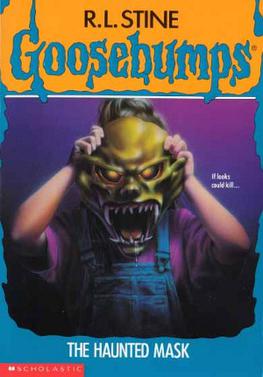
The Haunted Mask is the eleventh book in the original Goosebumps, the series of children's horror fiction novels created and written by R. L. Stine. The book follows Carly Beth, a girl who buys a Halloween mask from a store. After putting on the mask, she starts acting differently and discovers that the mask has become her face; she is unable to pull the mask off. R. L. Stine says he got the idea for the book from his son who had put on a Frankenstein mask he had trouble getting off.

Maureen Elizabeth Reagan was an American political activist and the first child of U.S. president Ronald Reagan and his first wife, actress Jane Wyman. Her brother is Michael Reagan and her half-siblings are Patti Davis and Ron Reagan, from her father's second marriage.

Bless Me, Ultima is a coming-of-age novel by Rudolfo Anaya centering on Antonio Márez y Luna and his mentorship under his curandera and protector, Ultima. It has become the most widely read and critically acclaimed novel in the New Mexican literature canon since its first publication in 1972. Teachers across disciplines in middle schools, high schools and universities have adopted it as a way to implement multicultural literature in their classes. The novel reflects Hispano culture of the 1940s in rural New Mexico. Anaya's use of Spanish, mystical depiction of the New Mexican landscape, use of cultural motifs such as La Llorona, and recounting of curandera folkways such as the gathering of medicinal herbs, gives readers a sense of the influence of indigenous cultural ways that are both authentic and distinct from the mainstream.
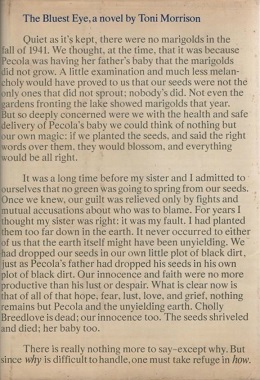
The Bluest Eye, published in 1970, is the first novel written by Toni Morrison. The novel takes place in Lorain, Ohio, and tells the story of a young African-American girl named Pecola who grew up following the Great Depression. Set in 1941, the story is about how she is consistently regarded as "ugly" due to her mannerisms and dark skin. As a result, she develops an inferiority complex, which fuels her desire for the blue eyes she equates with "whiteness".

My Secret Garden: Women’s Sexual Fantasies is a 1973 book compiled by Nancy Friday, who collected women's fantasies through letters and tapes and personal interviews. After including a female sexual fantasy in a novel she submitted for publishing, her editor objected, and Friday shelved the novel. After other women began writing and talking about sex publicly, Friday began thinking about writing a book about female sexual fantasies, first collecting fantasies from her friends, and then advertising in newspapers and magazines for more. She organized these narratives into "rooms", and each is identified by the woman's first name, except for the last chapter, "odd notes", which is presented as the "fleeting thoughts" of many anonymous women. The book revealed that women fantasize, just as men do, and that the content of the fantasies can be as transgressive, or not, as men's. The book, the first published compilation of women's sexual fantasies, challenged many previously accepted notions of female sexuality.
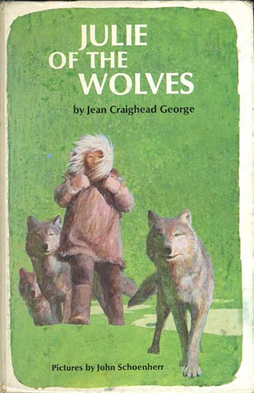
Julie of the Wolves is a children's novel by Jean Craighead George, published by Harper in 1972 with illustrations by John Schoenherr. Set on the Alaska North Slope, it features a young Inuk girl experiencing the changes forced upon her culture from outside. George wrote two sequels that were originally illustrated by Wendell Minor: Julie (1994), which starts 10 minutes after the first book ends, and Julie's Wolf Pack (1997), which is told from the viewpoint of the wolves.
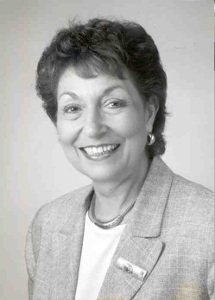
Judith Fingeret Krug was an American librarian, freedom of speech proponent, and critic of censorship. Krug became director of the Office for Intellectual Freedom at the American Library Association in 1967. In 1969, she joined the Freedom to Read Foundation as its executive director. Krug co-founded Banned Books Week in 1982.

Welcome to Dead House is the first book in the original Goosebumps book series. It was first published in July 1992 along with Stay Out of the Basement and Monster Blood, the second and third books. Additionally, it was re-released in 2010 as the thirteenth book under the Classic Goosebumps title, featuring new artwork by Brandon Dorman.
The Kanawha County Textbook War, also known as the Kanawha County Textbook Controversy, was a violent school control struggle in the 20th century United States. It led to the largest protests ever in the history of Kanawha County, West Virginia, the shooting of one bystander, and extended school closings. The controversy erupted in 1974 when new, multicultural textbooks were introduced that some parents considered blasphemous.
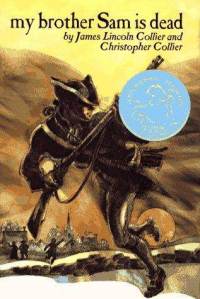
My Brother Sam Is Dead is a 1974 young-adult historical fiction novel by James Lincoln Collier and Christopher Collier. The book takes place in Redding, Connecticut during the American Revolution, and is told from the perspective of a young boy, Timothy Meeker. The novel details Tim's brother, Samuel, and his desire to fight for the Patriots, despite his father's opposition to the war. Ultimately, Tim is forced to decide between siding with his brother and joining the colonies’ war efforts, or abiding by his father's anti-war wishes.
Louise S. Robbins is an American academic and formerly director of the University of Wisconsin–Madison School of Library and Information Studies.
Janice Slepian, was an author of books for children and young adults and a poet. She obtained a degree in psychology at Brooklyn College, later doing graduate work in clinical psychology and speech pathology at the University of Washington in Seattle. She worked as a speech therapist at Massachusetts General Hospital in Boston and then embarked on a writing career.
Connie Ann Kirk is an American author. Her books cover a range of subjects including concise literary biographies for students, bio-critical literary studies, and references. She has also written a fiction picture book for children. Her articles, both in print and online, address topics in literature, poetry, popular culture, history, education, art, television, science, sports, and film.
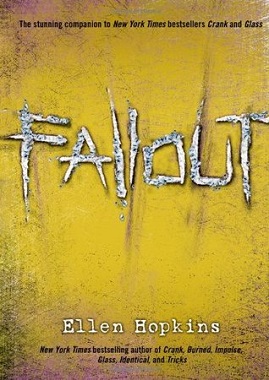
Fallout is a 2010 young adult novel by author Ellen Hopkins. It follows Glass in the Crank series.
Book censorship is the removal, suppression, or restricted circulation of literary, artistic, or educational material on the grounds that it is objectionable according to the standards applied by the censor. The first instance of book censorship in what is now known as the United States, took place in 1637 in modern-day Quincy, Massachusetts. While specific titles caused bouts of book censorship, with Uncle Tom’s Cabin frequently cited as the first book subject to a national ban, censorship of reading materials and their distribution remained sporadic in the United States until the Comstock Laws in 1873. It was in the early 20th century that book censorship became a more common practice and source of public debate. Throughout the 20th and early 21st centuries there have been waves of attempts at widespread book censorship in the US. Since 2022, the country has seen a dramatic increase of attempted and successful censorship, with a 63% rise in reported cases between 2022 and 2023, including a substantial rise in challenges filed to hundreds of books at a time. In recent years, about three-fourths of books subject to censorship in the US are for children, pre-teenagers, and teenagers.
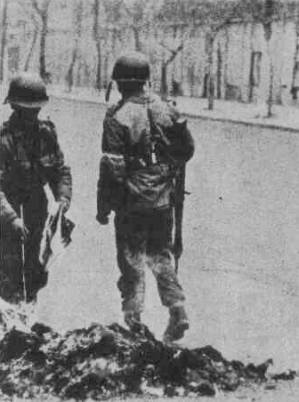
Book censorship is the act of some authority taking measures to suppress ideas and information within a book. Censorship is "the regulation of free speech and other forms of entrenched authority". Censors typically identify as either a concerned parent, community members who react to a text without reading, or local or national organizations. Books have been censored by authoritarian dictatorships to silence dissent, such as the People's Republic of China, Nazi Germany and the Soviet Union. Books are most often censored for age appropriateness, offensive language, sexual content, amongst other reasons. Similarly, religions may issue lists of banned books, such as the historical example of the Catholic Church's Index Librorum Prohibitorum and bans of such books as Salman Rushdie's The Satanic Verses by Ayatollah Khomeini, which do not always carry legal force. Censorship can be enacted at the national or subnational level as well, and can carry legal penalties. In many cases, the authors of these books could face harsh sentences, exile from the country, or even execution.













